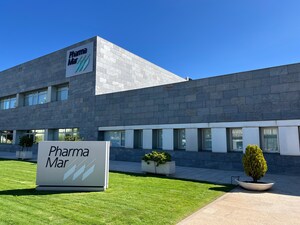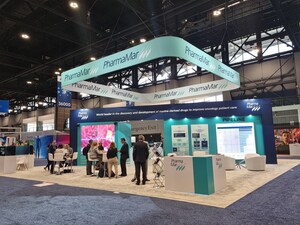New Positive Data on PM1183 Sees a Response Rate of 36% as Single Agent in Patients With Advanced and Relapsed Small-Cell Lung Cancer
MADRID, September 12, 2017 /PRNewswire/ --
PharmaMar (MSE: PHM) presented during the European Society for Medical Oncology congress (ESMO), held in Madrid, positive results of PM1183 (lurbinectedin) in a cohort of 36 patients as monotherapy in patients with advanced and relapsed small-cell lung cancer.
(Logo: http://photos.prnewswire.com/prnh/20150203/727958-b )
The abstract #1529 'Activity of lurbinectedin (PM1183) as single agent and in combination in patients with advanced small cell lung cancer (SCLC)' shows an objective response rate of 36% when PM1183 is used as a single agent.
The results become of special relevance if it is taken into account that microcitic lung cancer is the most aggressive type of lung cancer for which only one treatment exists, topotecan, approved more than 15 years ago in advanced and relapsed illness. This drug shows a response rate that varies between 17% and 24%.
Dr María Eugenia Olmedo, Oncologist at the Ramon y Cajal Universitary Hospital explains, "PM1183 is a promising compound either in combination or as a single agent in the subtypes of lung cancer. Especially attractive is the combination with anthracyclines given their well-known activity in this type of cancer, and also with a well-known and manageable toxicity."
As she explains, "70% of patients have metastasis at the moment of diagnosis. Despite this being one of the most sensitive solid tumors to chemo and radio therapy, the response is of a limited duration and the efficacy of the salvage treatment, very poor. This explains the limited survival of these patients and the necessity for new therapies."
Dr Olmedo highlighted the small number of progress that exists up to today in SCLC. "The therapeutic developments in this illness have been scarce for more than 15 years. We need new therapeutic approaches and new compounds that can change the course of this illness that has such a high mortality rate."
This abstract also shows the cohort B results reached in the Phase II clinical study of PM1183 in combination with doxorubicin that later resulted in the start of the pivotal Phase III Atlantis trial, currently recruiting patients, and where a progression free survival of at least 5.3 months is reached and an objective response of 37% is observed in patients in a combination with doxorubicin. This PFS increases up to 6.2 months in platinum sensitive patients.
Media Relations
+34-638-79-62-15
Investor Relations
+34-914444500






Share this article